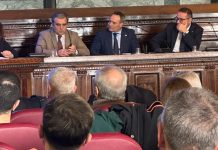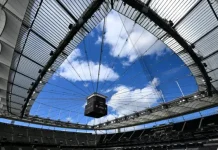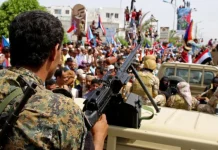On Monday, FIFA Ethics and Regulations Watch (FERW) held a conference in London on the prospects of the 2022 World Cup in Qatar and its role in the development of third world countries.
The conference raised the slogan “The role of the World Cup Qatar 2022 in the development of Africa and Asia” and how the tournament will help some countries on the two continents to promote the sports sectors, especially football.
The conference was attended by a group of economists, sports and development experts, and included three papers presented by economist and relations expert, Eric Francis Manu, representative of the National Development Committee from Sierra Leone in London, Robert Kargbo, and spokeswoman of the FIFA Watch, Anna Lutskova De Bacci. The meeting was attended by representatives of the local community in London and some African and European embassies.
In his presentation, Mr Manu pointed out the conditions for Qatar to host the World Cup, as requested by FIFA prior to winning the bid, which depends heavily on the idea of sustainability and transfer of entire facilities and stadiums to some developing countries in Africa and Asia.
He pointed out that most stadiums will contain standard designs to facilitate removal of such as facilities, seats, rooms and basic tools upon the end of the World Cup 2022. These seats will be donated to football projects around the world, helping to spread the love of the game and stimulate its development around the world. For example, Ras Abu Abboud Stadium in Doha will be the first FIFA stadium that can be completely reused for the 2022 event.
He expressed his hope for Qatar to donate its stadiums to Africa because it would help the countries of the continent in the development process, stressing that it is a great idea to gift such facilities to poor countries, which requires FIFA to adopt this wonderful idea all the time.
He added that Qatar has recently changed and improved the conditions of Asian and African workers who are building the World Cup facilities, in addition to the abolition of Doha sponsorship law, which gave them all rights of internationally recognized workers, especially those sponsored by the International Labor Organization and global trade unions.
It is also important to note that the 2022 World Cup in Qatar is being subjected to negative campaigns as reported in British newspapers such as Sir Linton Crosby’s offer to campaign for the cancellation of the 2022 World Cup in Qatar and give it to another country for £5.5 million, according to a leaked plan.
Crosby said that, if he took part in the lobbying campaign, his CTF Partners would need £300,000 a month for 18 months to focus on the efforts to delegitimize the Qatari government and put pressure on FIFA to “reinstate the bidding process and award the World Cup to another country.”
As part of the stadium document, called Project Ball, Crosby said CTF partners could create full-time war rooms around the world to spread negative stories about Qatar in mainstream media, launch fake publicity campaigns on social media, and potentially pressure friendly politicians and journalists.
As Ms Lutskova De Bacci stated, FIFA Watch will start implementing a development project in Africa and Asia and will work with the international sports institutions to contribute to the development of the sports sector, expressing the hope that the Qatari government will donate all of the 2022 World Cup stadiums and logistics tools to help sports in Africa.
Mr Kargbo presented his report on the situation on the continent, proving the urgent need for development. Extreme poverty in Africa makes governments’ priorities on the continent focus on the health, education and public services sectors, thus neglecting sports, he said.
“Some of those governments have signed contracts with European and Chinese companies that included conditions for local development, which often did not happen.”
Mr Kargbo expressed his delight at the idea of transferring football stadiums to the third world countries, which is the first of its kind, and wished for it to be implemented periodically starting from the 2022 World Cup in Qatar.
FIFA Watch, an independent international organization based in Zurich, aims to ensure that FIFA is free of corruption and that all countries are treated equally in the implementation and hosting of its events and through the monitoring of sports development in the third world countries.
FIFA Watch began in 2016 as an initiative of former footballers and human rights activists. The basic idea was to blend sports with human rights. In 2017, the idea turned into an organisation that is growing rapidly every year with its followers and supporters.
One of the most important projects of the organization is creating gender equality, building sports facilities around the world, and encouraging large companies to contribute to developing countries.
See photos from the conference here













